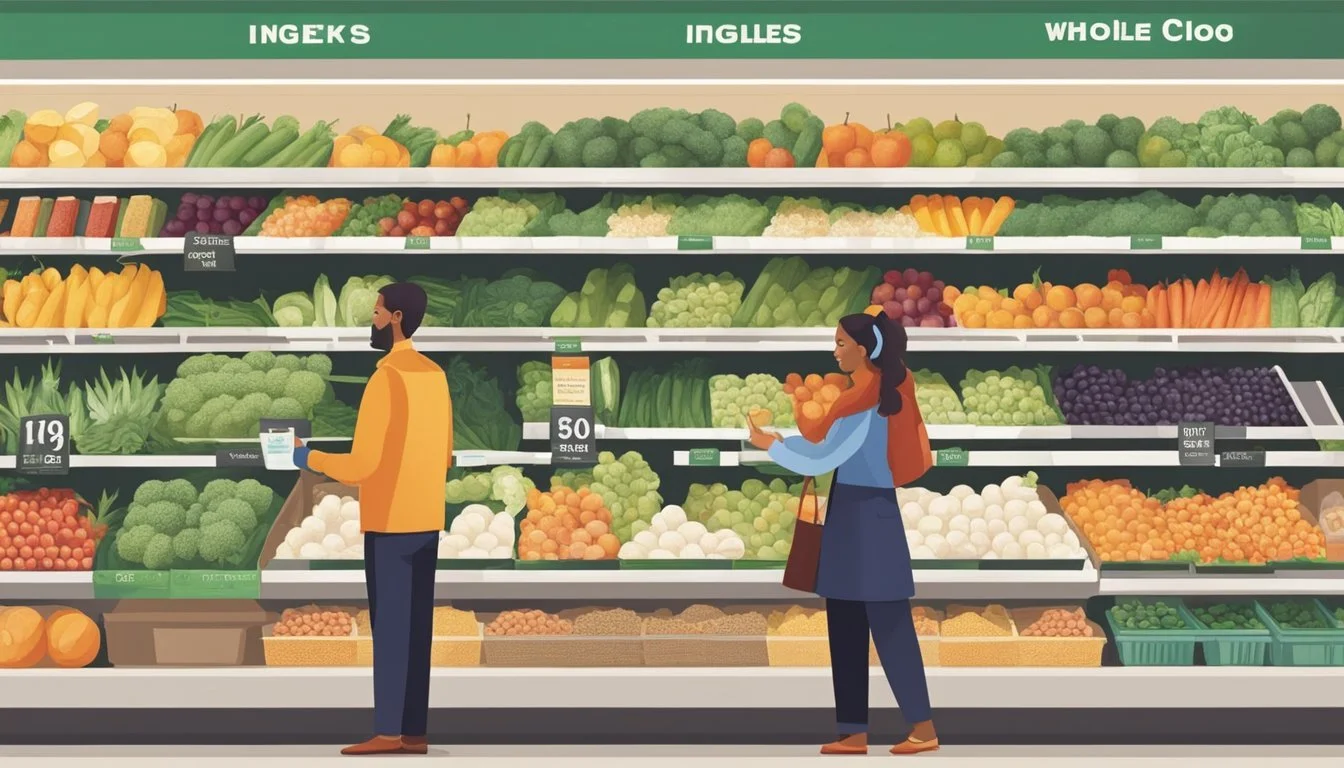Ingles Markets vs Whole Foods
Comparing Prices, Quality, and Selection
Ingles Markets and Whole Foods are two popular grocery store chains with distinct reputations and offerings. Ingles, a regional supermarket primarily serving the southeastern United States, focuses on providing affordable groceries and household essentials. Whole Foods, now owned by Amazon, is known for its emphasis on organic and natural products.
When comparing Ingles Markets and Whole Foods, the choice largely depends on individual preferences and priorities. Ingles typically offers lower prices on everyday items, making it appealing for budget-conscious shoppers. Whole Foods, while generally more expensive, caters to those seeking a wider selection of organic, specialty, and health-focused products.
Both supermarket chains strive to maintain quality standards, but their approaches differ. Ingles Markets emphasizes value and local products, while Whole Foods focuses on organic and sustainably sourced items. The decision between these two grocery stores often comes down to personal values, dietary needs, and financial considerations.
Company Profiles
Ingles Markets and Whole Foods Market are two prominent grocery chains with distinct business models and target markets. Both companies have established unique identities in the competitive supermarket industry.
Ingles Markets Overview
Ingles Markets is a regional supermarket chain headquartered in Black Mountain, North Carolina. Founded in 1963, the company operates 198 stores across six southeastern states. Ingles focuses on serving smaller communities and rural areas along the Appalachian region.
The company offers a wide range of products, including fresh produce, meats, dairy, and household items. Ingles stores often feature in-house bakeries, delis, and pharmacies. The chain is known for competitive pricing and a strong emphasis on customer service.
Ingles Markets is publicly traded on NASDAQ under the ticker symbol IMKTA. The company's business strategy centers on steady expansion and maintaining a strong presence in its core markets.
Whole Foods Market Overview
Whole Foods Market, founded in 1980, is a national grocery chain specializing in natural and organic products. The company was acquired by Amazon in 2017 for $13.7 billion, significantly impacting its operations and pricing strategies.
With over 500 stores across the United States, Whole Foods is known for its high-quality organic produce, sustainably sourced meats, and extensive selection of specialty items. The chain caters to health-conscious consumers and those seeking premium grocery options.
Whole Foods stores often feature prepared food sections, juice bars, and cafes. The company has been a pioneer in promoting organic and non-GMO products. Since the Amazon acquisition, Whole Foods has integrated with Amazon Prime, offering exclusive discounts to members.
Location and Accessibility
Ingles Markets and Whole Foods differ significantly in their store distribution and delivery options. These factors play a crucial role in determining convenience for shoppers.
Store Distribution and Reach
Ingles Markets operates primarily in the southeastern United States, with a strong presence in North Carolina, South Carolina, Georgia, Tennessee, Alabama, and Virginia. The chain boasts over 200 stores across these states, focusing on rural and suburban areas.
Whole Foods, owned by Amazon, has a broader national presence with over 500 stores across the United States. The chain concentrates on urban and suburban locations, often found in higher-income neighborhoods and major metropolitan areas.
Convenience and Grocery Delivery Options
Ingles Markets offers online ordering and curbside pickup at select locations. Their delivery options are limited, typically relying on third-party services in certain areas.
Whole Foods, leveraging Amazon's infrastructure, provides extensive delivery options. Amazon Prime members enjoy free two-hour delivery from Whole Foods in many cities. The chain also offers curbside pickup at numerous locations.
Both stores have mobile apps for easy ordering. Whole Foods' integration with Amazon Prime gives it an edge in terms of delivery convenience for Prime subscribers.
Product Selection and Quality
Ingles Markets and Whole Foods offer distinct product ranges and quality standards. Both stores prioritize fresh produce, meats, and specialty items, but their approaches differ in several key areas.
Organic and Conventional Produce
Whole Foods is renowned for its extensive organic produce selection. The store stocks a wide variety of certified organic fruits and vegetables, often sourced from local farms. Ingles Markets carries organic options but maintains a larger conventional produce section.
Whole Foods emphasizes sustainability and strict quality standards for its produce. Many items are labeled with origin information and farming practices. Ingles Markets focuses on affordability, offering competitive prices on both organic and conventional produce.
Both stores strive to provide fresh, high-quality fruits and vegetables. However, Whole Foods typically has a broader selection of unique and exotic produce items.
Meat and Seafood Offerings
Whole Foods adheres to strict animal welfare standards for its meat products. The store offers a range of grass-fed, organic, and free-range options. Seafood at Whole Foods is sourced according to sustainability guidelines.
Ingles Markets provides a mix of conventional and premium meat options. The store carries organic and natural meats but in a more limited selection compared to Whole Foods. Ingles' seafood counter offers fresh and frozen options at competitive prices.
Both stores feature in-house butchers who can provide custom cuts and advice. Whole Foods typically has more extensive information about sourcing and animal welfare practices.
Dairy, Bakery, and Deli
Whole Foods excels in offering a wide range of organic, plant-based, and specialty dairy products. The store's bakery produces artisanal breads, pastries, and cakes using high-quality ingredients. Its deli features gourmet prepared foods and a variety of international cheeses.
Ingles Markets provides a solid selection of dairy products, including organic options. The bakery offers fresh-baked goods daily, focusing on traditional favorites. Ingles' deli provides a range of prepared foods and sliced meats and cheeses.
Both stores cater to dietary restrictions with gluten-free and vegan options. Whole Foods generally offers a broader range of specialty and gourmet items in these departments.
Pricing Strategies
Ingles Markets and Whole Foods employ distinct pricing approaches to attract and retain customers. Their strategies encompass everyday pricing, promotional offers, and targeted loss leaders.
Comparison of Everyday Prices
Ingles Markets generally maintains lower everyday prices compared to Whole Foods. A typical basket of common grocery items at Ingles costs 10-15% less than at Whole Foods. For example, a gallon of milk at Ingles averages $3.50, while Whole Foods prices it around $4.25.
Produce prices show similar disparities. Bananas at Ingles sell for about $0.59 per pound, whereas Whole Foods charges $0.79 per pound. However, Whole Foods often offers higher quality or organic options, which partially accounts for the price difference.
Store-brand items showcase the most significant price gaps. Ingles' Laura Lynn brand provides substantial savings over Whole Foods' 365 line on comparable products.
Discounts, Deals, and Loyalty Rewards
Both chains offer loyalty programs, but their approaches differ. Ingles' Advantage Card provides personalized discounts and fuel savings. Members earn points on purchases, redeemable for groceries or gas.
Whole Foods leverages Amazon Prime for its rewards program. Prime members receive exclusive discounts on select items and an additional 10% off sale prices. However, this requires a separate Amazon Prime subscription.
Ingles frequently runs weekly specials and buy-one-get-one deals. Whole Foods focuses more on periodic category-wide sales, like 20% off all wines or $2 off per pound on certain meats.
Effectiveness of Loss Leaders
Both stores utilize loss leaders to drive traffic, but their strategies diverge. Ingles often uses staple items like milk, eggs, or bread as loss leaders. These products are priced at or below cost to attract budget-conscious shoppers.
Whole Foods takes a different approach, using trendy or seasonal items as loss leaders. They might deeply discount organic berries in summer or specialty pumpkin products in fall. This tactic aims to reinforce their image as a destination for premium, seasonal goods.
Ingles' loss leader strategy tends to be more effective at driving regular, repeat visits. Whole Foods' approach is better at creating buzz and encouraging impulse purchases of higher-margin items alongside the discounted products.
Brand and Store Experience
Ingles Markets and Whole Foods offer distinct brand identities and shopping environments. Their approaches to store brands, customer service, and overall atmosphere shape the experience for shoppers.
Store Brand Offerings
Whole Foods' 365 Everyday Value line provides organic and natural options at lower price points. These products span categories from pantry staples to frozen foods. Ingles Markets features its Laura Lynn brand, offering affordable alternatives across grocery departments.
Both chains use store brands to compete with national brands on price. Whole Foods emphasizes premium ingredients and environmental standards in its private label. Ingles focuses on family-friendly value with Laura Lynn.
Families often find Ingles' store brand more budget-friendly for everyday items. Whole Foods' 365 line appeals to health-conscious shoppers seeking organic choices.
Customer Service and Shopping Environment
Whole Foods cultivates an upscale atmosphere with spacious aisles and artful product displays. Staff members are knowledgeable about natural and organic foods. The stores often feature in-house cafes and extensive prepared food sections.
Ingles Markets aims for a practical, family-oriented experience. Stores are well-organized with clearly marked sections. Employees focus on efficiency and helpfulness.
Whole Foods typically attracts customers seeking a curated shopping experience. Ingles caters to shoppers prioritizing convenience and value. Both chains strive for cleanliness and order in their stores.
Customer service at Whole Foods often includes product recommendations and nutrition advice. Ingles staff excel at assisting with locating items and facilitating quick checkouts.
Sustainability and Ethical Practices
Whole Foods and Ingles Markets have embraced sustainability and ethical practices, though with differing approaches and levels of commitment. Both supermarkets recognize the importance of environmental stewardship and community engagement.
Environmental Initiatives
Whole Foods has made significant strides in environmental sustainability. The company has implemented a Green Mission program across its stores, incorporating eco-friendly practices like composting, water conservation, and energy-efficient lighting. Many Whole Foods locations use renewable energy sources and have adopted low-flow toilets to reduce water consumption.
Ingles Markets has taken steps to reduce its environmental impact as well. The company has installed energy-efficient refrigeration systems and LED lighting in many of its stores. Ingles also encourages recycling and offers reusable shopping bags to customers.
Community Involvement and Fair Trade
Whole Foods places a strong emphasis on community involvement and fair trade practices. The company sources products from local farmers and artisans, supporting regional economies. Whole Foods also partners with fair trade organizations to ensure ethical sourcing of products like coffee, tea, and chocolate.
Ingles Markets focuses on supporting local communities through various initiatives. The company donates to food banks and sponsors local events. Ingles also sources some products from local farmers, though on a smaller scale compared to Whole Foods.
Both supermarkets offer organic options, with Whole Foods having a more extensive selection. This commitment to organic products benefits both consumers and the environment by reducing the use of synthetic pesticides and fertilizers.
Consumer Perception and Ratings
Shoppers have strong opinions about Ingles Markets and Whole Foods, reflecting their experiences with product quality, pricing, and customer service. Consumer surveys and online reviews provide valuable insights into how these grocery chains are perceived.
Customer Satisfaction Surveys
Consumer Reports regularly conducts comprehensive surveys of grocery stores across the United States. In recent ratings, regional chains like Ingles Markets have performed well, often outranking larger national competitors. Whole Foods, known for its organic offerings, typically scores high in categories like produce quality and store cleanliness.
Ingles Markets receives praise for competitive pricing and friendly staff. Whole Foods earns high marks for its wide selection of organic and specialty items. However, some shoppers find Whole Foods prices to be higher than other options.
Online Reviews and Testimonials
Customer feedback on review sites and social media platforms offers a more granular look at shopper experiences. Ingles Markets garners positive comments about its local produce and meat departments. Customers appreciate the chain's community involvement and regional focus.
Whole Foods reviews often highlight the store's high-quality prepared foods and extensive organic selection. Some customers express concerns about pricing, while others feel the quality justifies the cost. Both chains receive mixed feedback on checkout times and product availability, common pain points in the grocery industry.
Social media engagement shows loyal followings for both stores, with customers sharing recipes and product finds. This online interaction provides valuable real-time feedback for both Ingles Markets and Whole Foods to continually improve their offerings and services.
Conclusion
Ingles Markets and Whole Foods cater to different grocery shopping preferences. Ingles offers competitive prices and a wide selection of local products. The regional chain maintains strong community ties in its southeastern U.S. markets.
Whole Foods focuses on organic and natural offerings, with higher price points reflecting its premium positioning. The national retailer provides extensive specialty departments and prepared foods options.
Both chains emphasize fresh produce and meats. Ingles typically appeals to budget-conscious shoppers seeking familiar brands. Whole Foods attracts health-focused consumers willing to pay more for organic and gourmet items.
Store atmosphere differs significantly. Ingles provides a no-frills shopping experience in many locations. Whole Foods creates an upscale environment with attractive displays and sampling stations.
Customer service quality can vary by individual store for both chains. Whole Foods generally receives higher marks for knowledgeable staff, while Ingles often garners praise for friendly local employees.
The better choice depends on individual priorities. Shoppers focused on affordability may prefer Ingles. Those seeking organic variety and prepared foods might choose Whole Foods. Many customers shop at both to meet different needs.








